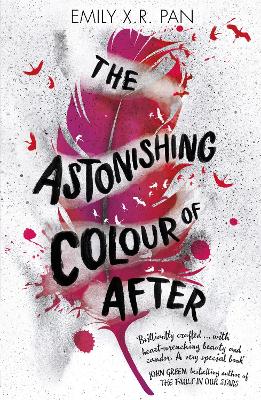Reviewed by nannah on
It's funny how sometimes you can tell when a piece of media about a marginalized group was meant for that marginalized group to consume or … to be for people completely alienated from that group to ogle at them.
This book fits into this category.
Book content warnings
SUICIDE. (also cw for the review)
- extremely graphic depictions of suicide, suicidal ideation, etc. (I had to call a hotline. please be safe when deciding whether or not to read this book).
I've been trying to find out if Emily X.R. Pan has any personal experience with depression, but I can't find any information. This is important, because you need to understand who you're writing for. Did she consider there would be any depressed people in her reading audience? According to Mental Health America , 12.63% American young adults in 2019 have major depressive episodes. That may not seem like much, but for every 100 kids, about 13 of them are affected by depression.
What I'm trying to say, is that who are you writing for? This book is about grief, undoubtedly. But it's also about depression, and to isolate depressed readers, a marginalized group, by writing about them like animals in a zoo, rather than for them, is such a bad choice.
Okay, I'm done.
Summary:
After Leigh's mom commits suicide, Leigh believes she has turned into a giant, red bird who urges her on a mission to Taiwan to visit her grandparents for the first time. There, she needs to find her mother, rediscover lost memories, and create a relationship with the grandparents she had always been forbidden to see.
The good:
The main interracial relationship -- that doesn't consist of a poc and a white person! It's always nice to see; most often in media people seem to forget you don't always NEED a white person in a relationship for it to be interracial, lmao.
I loved Leigh's grandparents. Loved them. Their relationships with both Leigh and Leigh's mother were so heart-breaking and lovely. I loved reading about that and couldn't get enough of it.
Unfortunately, this is all I have.
The bad:
The colors. Leigh describes everything she sees as feeling it in color. It took me about 100 pages in to realize she didn't actually have synesthesia, aka someone who experienced her world in color. Instead she's just a hipster art student who pretended she did. It could have been done well, except instead of using regular colors--or even more specific colors--the author used such niche and random, awkward colors nobody would ever know, such as
- quinacridone rose
- gamboge yellow
- diaxozine purple
- pyrazolone orange
- stil de grain brown
- disazo scarlet
- Antwerp blue
- naphthol red
which made the prose, and her character, pretty much insufferable. There are so many colors you could use that can do the job without using this format over and over and over. It was always ___ red or ____ blue, never just amber or lilac or mauve, etc.
The romantic side plot between Leigh and Axel. I know I literally just praised an element of it above, but I felt its entirety was unneeded. This book is huge, and I felt whenever the chapters flashed back to a bit with Axel, it took away from the main conflict.
The plot itself felt very weak. The book is more of a series of flashbacks than it was a story with an actual plot propelling characters forward. There are actually more flashbacks than scenes set in the current storyline. I know it's to get Leigh to realize her family is important and that memories are to remind her to live for today, but it's such a long-winded road to get there.
The ugly:
The representation of mental illness. I've discussed it above (at length), but largely my problem is that depression is like this thing, this illness that Must Not Be Named. It's evil, it's mysterious, and the protagonist and her father never actually talk about it, and it's never de-mystified. This isn't representation, it's a spectacle. And that makes me, a mentally ill person, really upset.
suicide discussion
There's also absolutely NO REASON you should describe suicide and suicidal thoughts in grotesque detail for such long page time!! This is what made me have to stop reading and contact a hot line. I was doing SO WELL, and then I plunged back into suicidal thoughts. The author went into a flashback montage scene describing Leigh's mom thinking about pretty much every time she wanted to commit suicide, in excruciating detail. WHY. This is what I mean about considering your audience! Do you want depressed young adults reading and experiencing this and these thoughts again? I can't believe so many people read and approved this for publication!!
A lot of this book is also very hard to believe. A father leaving his daughter alone with his parents in law for months, alone? Because he has an argument over food, of all things? Just drops her off and leaves her in Taiwan, where she doesn't speak the language of her grandparents, and goes to Hong Kong, and doesn't even check in on her--and doesn't get worried when she doesn't check in with him for months?
It's all too convenient for the story to happen, and I don't buy it.
Things like that happen all throughout the story. I can't get over it.
Anyway, I didn't enjoy the book (I mean ... it made me contact a hotline ...), and I don't understand all the acclaim it has gotten. It makes me so angry, because everyone has loved it, and I just don't understand. How could I have missed it?
Reading updates
- Started reading
- 1 February, 2019: Finished reading
- 1 February, 2019: Reviewed
